
When you have a lumbar strain, avoid certain activities and behaviors that can exacerbate the injury or delay healing.
Contents
hide
Here are some key things to avoid…
Avoid Heavy Lifting
- Why – Lifting heavy objects can put undue stress on your lumbar spine, worsening the strain.
- Alternative – If you must lift something, use proper lifting techniques: bend your knees, keep your back straight, and lift with your legs, not your back.
Avoid Prolonged Sitting or Standing
- Why – Staying in one position for too long can increase stiffness and discomfort in the lumbar region.
- Alternative – Take frequent breaks to move around and change positions. If you must sit for extended periods, ensure proper lumbar support.
Avoid High-Impact Activities
- Why – Activities such as running, jumping, or any high-impact sports can aggravate a lumbar strain.
- Alternative – Engage in low-impact exercises like walking, swimming, or using an elliptical machine, which is gentler on the back.
Avoid Twisting Movements
- Why – Twisting your torso, especially while lifting, can further strain the lumbar muscles.
- Alternative – Be mindful of your movements and avoid any actions that involve twisting your spine.
Avoid Poor Posture
- Why – Slouching or sitting with poor posture can increase stress on your lumbar spine.
- Alternative – Maintain good posture, with your back straight and shoulders back. Use ergonomic chairs and supportive pillows if necessary.
Avoid Sleeping on Your Stomach
- Why – Sleeping on your stomach can strain your lower back.
- Alternative – Sleep on your back with a pillow under your knees, or on your side with a pillow between your knees to maintain proper spinal alignment.
Avoid Ignoring Pain
- Why – Ignoring pain and continuing to engage in activities that cause discomfort can worsen the injury.
- Alternative – Listen to your body and rest as needed. Use pain as a guide to avoid activities that may exacerbate your condition.
Avoid Overusing Pain Medication
- Why – Relying too heavily on pain medication can mask symptoms and lead to overexertion, potentially worsening the strain.
- Alternative – Use medication as directed by a healthcare professional and combine it with other treatments like physical therapy, ice/heat therapy, and rest.
Avoid Delaying Treatment
- Why – Delaying appropriate treatment can lead to chronic pain and longer recovery times.
- Alternative – Seek medical advice promptly if your pain is severe, persistent, or accompanied by other symptoms like numbness or weakness.
Avoid Sedentary Lifestyle
- Why – Being inactive can lead to muscle weakness, and stiffness, and impede recovery.
- Alternative – Engage in gentle, low-impact activities and stretching exercises as recommended by a healthcare provider to maintain mobility and strength.
Avoid Inappropriate Stretching and Exercises
- Why – Some stretches and exercises can exacerbate lumbar strain if done improperly or too soon.
- Alternative – Follow a physical therapist’s guidance for safe and effective exercises tailored to your condition.
Key Takeaways
- Rest and Gradual Return – Allow time for your lumbar strain to heal and gradually return to normal activities.
- Listen to Your Body – Avoid any activities or movements that cause pain or discomfort.
- Seek Professional Guidance – Consult healthcare professionals for a personalized treatment and recovery plan.
By avoiding these activities and behaviors, you can promote faster healing and prevent further injury to your lumbar spine.
Related Posts
Can Liver Problems Cause Lower Back Pain?
On
July 20, 2022
What Does a Slipped Disc Feel Like in Lower Back?
On
July 26, 2022
How To Rehab A Lumbar Strain?
On
May 5, 2024
What Makes Lumbar Pain Worse?
On
May 11, 2024


